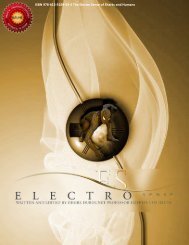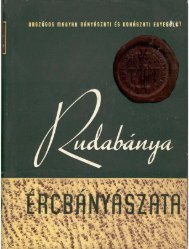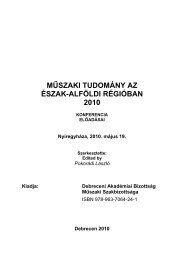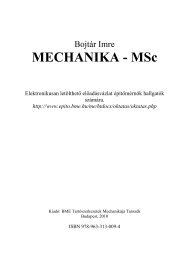Create successful ePaper yourself
Turn your PDF publications into a flip-book with our unique Google optimized e-Paper software.
Preventing Problems<br />
How do you prevent problems from drinking too much juice? One easy way is to not introduce juice<br />
until your child is six months old. And when you do begin to offer your infant juice, give it in a cup<br />
and not a bottle.<br />
Older infants and toddlers generally drink too much juice when they always have a sippie cup in<br />
their hands, or if they are sucking on the cup like they would a bottle. Although sippie cups are<br />
convenient and it is nice to prevent messes, if you child always has one in his hands, then he is<br />
probably most at risk of getting cavities, since his teeth will always have sugar on them.<br />
To prevent your child's cups from becoming a security object for toddlers, it can help to restrict<br />
them to meals, when you offer milk, and snacks.<br />
It may also help to change to a "sport's bottle" type cup, which can also prevent spills and messes,<br />
but aren't as easy to drink out of as a regular sippie cup.<br />
The Juice 'Problem'<br />
One of the main problems with drinking too much juice, is that it is filling and will decrease your<br />
child's appetite for other more nutritious foods. While your child will still get a lot of calories, they<br />
will mostly be from sugars or carbohydrates, and not from fat or protein, which can contribute<br />
to a poorly balanced diet. Also, fruit juices generally don't have a lot of vitamins and nutrients,<br />
although they do have vitamin C and some are fortified with calcium. Also, if you child is drinking a<br />
lot of juice, then he probably isn't drinking much milk, which is a good source of calcium and other<br />
vitamins and nutrients<br />
Does Your Child Have a Problem With Juice?<br />
In general, if you child is eating a well balanced diet, including some fresh fruits and vegetables, is<br />
drinking 16 to 24 ounces a day of milk and dairy products, and doesn't have problems with cavities<br />
or being overweight, then he likely doesn't have a juice problem, even if you are exceeding the AAP<br />
limits.<br />
Take our Fruit Juice Poll - How Much Juice Do Your Children Drink?<br />
If your child is exceeding the AAP limits and is a picky eater, has a poorly balanced diet, cavities,<br />
diarrhea, chronic abdominal pain or if he is overweight, then you should consider taking steps to<br />
limit his intake of juice. You should definitely avoid letting your child fall asleep with a bottle or cup<br />
of juice, since that is probably the biggest risk factor for getting cavities. Also avoid giving 'fruit'<br />
drinks or 'fruit' sodas, since they may actually have very little fruit in them.<br />
The Benefits of Juice<br />
After all of this talk about the "juice" controversy, is there any reason to give your child juice at<br />
all? Many kids don't like eating fruit, so offering fruit juice is one way to get your child the 2 (for<br />
younger kids) to 4 servings (older kids) of fruit that is recommended in the Food Pyramid Guide. A<br />
6-ounce glass of 100% fruit juice can substitute for (but is not really equal to) one serving of fruit.<br />
The AAP advises that half of your child's fruit servings from the Food Pyramid Guide can come<br />
from 100% fruit juice.<br />
Still, it is important to remember that the recommended servings of fruit juice are actually limits.<br />
Your child does not need to drink any fruit juice, especially if he is getting the Food Guide Pyramid's<br />
recommended servings of fruit by eating whole fruit.<br />
Fruit juice can be helpful for children who are constipated and fruit juice diluted with fluoridated<br />
water is a good way to get your child fluoride if he doesn't like to drink plain water.<br />
Kids love the taste of pure fruit juice, and parents love it because it’s a healthy source of nutrients.<br />
When choosing healthy pure juice for your children, it’s important to note what kind of juice you<br />
are serving and how much you are offering. Here’s what families should know about fruit juice<br />
versus other fruit-flavored beverages:<br />
Choose the right fruit juice<br />
All juices are not created equal – some are nutritional gems while others are sugar water. Consider<br />
these tips as you make juice part of your child’s diet.<br />
Be label savvy. Buy juice labeled “100 percent fruit juice."<br />
• Beware of words like “drink,” “punch,” “cocktail,” “beverage” and “ade.” These are not 100<br />
percent juice – they’re junk fruit beverages.<br />
• Many “junk fruit beverages” are nutrient-void beverages, commonly masked as fruit “juice,”<br />
“drinks” or “cocktails.” Most contain 10 percent or less of pure fruit juice, and lots of water,<br />
sugar and additives. Junk fruit beverages have little or no nutritional value.<br />
• Avoid junk fruit beverages that are disguised as juice “blends” that contain small amounts of<br />
various fruits like grape, apple and pear. Ounce for ounce, these juices don’t have the natural<br />
levels of vital nutrients that 100 percent pure juices like orange juice provide. Plus, they usually<br />
contain added sugars.<br />
Examine the ingredients. Avoid fruit-flavored beverages that have added fructose corn syrup.<br />
They shape a child’s taste toward sweet cravings.<br />
Look at the juice. Generally, the cloudier the juice, the more nutritious it is. If you can see through<br />
it, you’re buying mostly water. Picture a tall glass of 100 percent pure orange juice with pulp.<br />
There should be some sediment at the bottom, which is a reminder of the juice’s origins.<br />
Go with citrus juices. Orange juice is a morning favorite and one of the most nutritious beverages<br />
available. An excellent source of vitamin C and potassium, orange juice also is a good source<br />
of folate and thiamin. Compared to other juices, orange juice is higher in protein, vitamin A,<br />
B-vitamins, vitamin C (it contains more than 10 times as much vitamin C as apple juice), calcium,<br />
iron and potassium, making it a heavyweight among fruit juices. Drinking an 8-ounce glass counts<br />
as one of your five necessary fruit and vegetable servings for the day.<br />
Check if it’s pasteurized. Commercial juices now are required to say if it’s pasteurized on the<br />
label. The new law is a result of non-pasteurized juice-borne bacterial illnesses that are especially<br />
harmful to people with weakened immune systems (such as children, pregnant women or the<br />
elderly). No need to worry, though. A new high-pressure pasteurization method increases the shelf<br />
life and significantly reduces the bacteria count. And, it reportedly does not affect the flavor or<br />
vitamin and mineral content of the juice. The key is to make sure the label on your juice says it’s<br />
pasteurized.<br />
Consider Juice Variety. Another beneficial juice in addition to orange juice is nectar juice. Nectar<br />
usually has more calories, but more nutrients are preserved during processing nectar than other<br />
juices. Apricot nectar is especially healthy, containing a lot of beta-carotene, almost a gram of<br />
protein per 8-ounce glass, and it’s higher than most juices in vitamin A, vitamin B-6 and iron.<br />
104 105

















